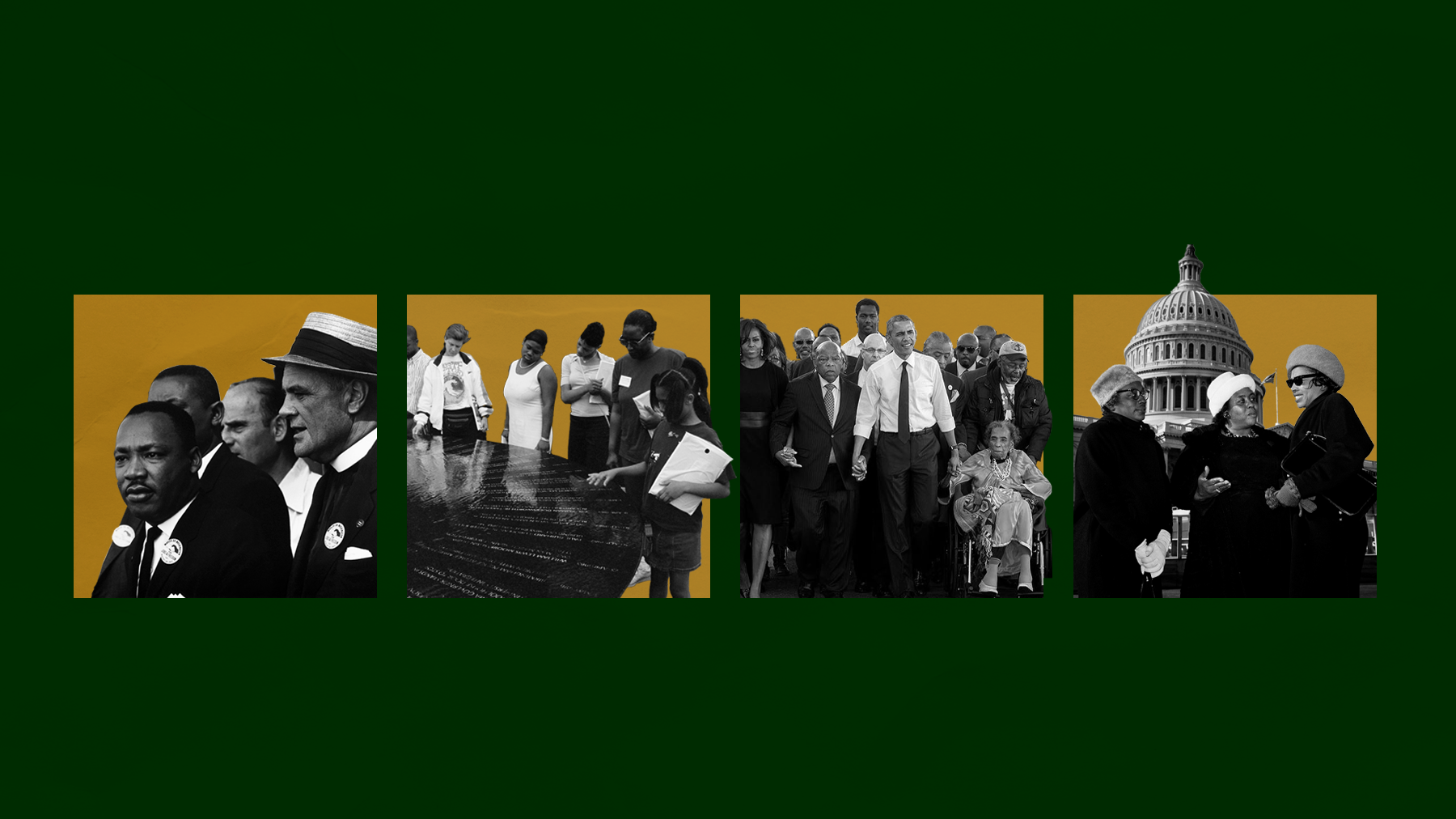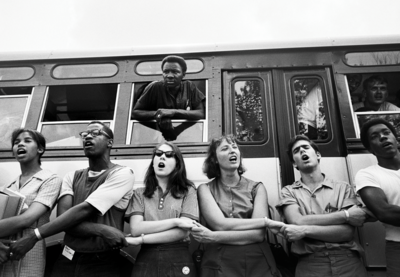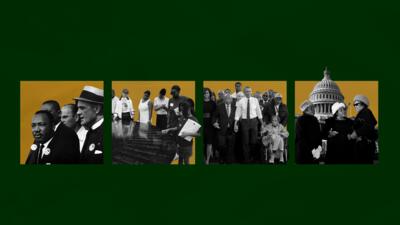Freedom Summer 1964 in Mississippi was a pivotal moment in the Black freedom struggle or Civil Rights Movement.
Listen to the Teaching Hard History Podcast, Season 3: The Civil Rights Movement, with host Hasan Kwame Jeffries.
Hasan Kwame Jeffries, Ph.D., points out that after emancipation, “African Americans’ primary goal was securing … freedom rights — the combination of civil rights and human rights that enslaved people identified as the crux of freedom.” For a century, the goal remained freedom.
Jeffries goes on to explain: “In the 1960s, during the height of the modern Civil Rights Movement, this universal aim found expression in the use of the term freedom to describe various movement elements. Volunteers who journeyed South to test compliance with desegregation mandates in interstate travel were Freedom Riders. The songs played at mass meetings were freedom songs. The singing group founded by SNCC activists was the Freedom Singers. The literary journal of the movement was Freedomways. Field organizers bedded down in freedom houses. All Black political parties were freedom parties. Agricultural cooperatives were named freedom farms. Schools designed to empower Black students were known as freedom schools. And the effort undertaken by SNCC activists in 1964 — to break the vise grip that segregationists had on the Magnolia State — was dubbed Freedom Summer.”
Voter Suppression
In 1964, Mississippi had the lowest voter registration rate for Black Americans in the nation, with only 6.7% of eligible Black voters registered. Across the South, Black citizens who attempted to register faced barriers such as “literacy tests,” scored at the discretion of the local white registrars and often based on arbitrary criteria, and job loss or other types of reprisals, including violence. Local White Citizens Councils (WCC) preserved the white supremacist social order by targeting those who sought to vote or to oppose segregation.
Freedom Summer 1964
Freedom Summer was an ambitious project to bring attention to the dire situation in Mississippi by ushering in an onslaught of volunteers to register Black voters.
Watch a video clip of John Lewis explaining the Mississippi Freedom Summer Project (from the Choices Program).
Initially the brainchild of Bob Moses of the Mississippi chapter of the Student Nonviolent Coordinating Committee (SNCC), the leadership of the project was collective and included civil rights workers from all the major civil rights organizations working under the umbrella of the Council of Federated Organizations (COFO). The Freedom Summer project grew to involve thousands of people, including local civil rights workers over 1,000 student volunteers, and all of the Black families who welcomed the young volunteers into their homes, often at great personal risk. The majority of the volunteers from the North were white college students, and many of them were Jewish. They helped with voter registration and with education for Black children.
The key elements of Freedom Summer were the Freedom Schools, the formation of the Mississippi Democratic Freedom Party (MDFP) and helping Black community members register to vote. The Freedom Schools offered over 2,000 students of varying ages an inquiry-based approach to education, both in more traditional subjects as well as social justice topics. The goal was to help young people realize their power.
Watch a video clip of Fannie Lou Hamer's testimony at the Democratic National Convention (from PBS.Org American Experience).
The Mississippi Democratic Freedom Party was formed by Fannie Lou Hamer, Ella Baker, Bob Moses and James W. Wright as an alternative to Mississippi’s segregationist Democratic Party, which excluded Black people from the vote. After holding a statewide convention in Mississippi, the MFDP sent delegates to the Democratic National Convention in Atlantic City, New Jersey, in an effort to be seated as the official delegates from Mississippi.
Watch a video clip summary of the 1964 murders (from Voices of the Civil Rights Movement).
Freedom Summer workers and volunteers faced hostile opposition from the white community, including several murders and dozens of beatings, bombings and fires. Among those murdered that summer in 1964 were three civil rights workers, whose deaths resulted in intensive media attention — James Chaney, a young Black CORE volunteer, and Michael Schwerner and Andrew Goodman, two Jewish activists from New York, who were murdered on June 21, 1964.
In the search for the three activists, eight other murdered Black men were found, including Charles Eddie Moore, a college student, and Henry Hezekiah Dee. These are but a handful of the people, the vast majority Black Americans, who were murdered or experienced violence during Freedom Summer and the momentous decades of the Civil Rights Movement.
The Movement Continues
Learn more:
“Understanding Voter Suppression in Today’s Election Process”
Today, many communities across the U.S. are falling prey to policies that discourage the teaching of honest history and inclusive education more generally. And strategies to suppressing voting continue to undermine our democracy and have increased over the past two decades as a backlash to more pluralistic political participation.
We can learn a great deal from those who engaged in Freedom Summer and —
With the ongoing movement today to ensure access to voting and fair elections, we honor those who risked their lives to cast a ballot, those who held firm to demand equality in the face of hate and white supremacy, and those who were killed trying to ensure the right to vote for others.
Resources on Freedom Summer
- PBS American Experience, Freedom Summer
- Teaching Hard History Podcast, Season 3, Episode 11: Young, Gifted and Black: Teaching Freedom Summer to K-5 Students
- Independent Voices collection from Reveal Digital, Freedomways
- SNCC Digital Gateway, Council of Federated Organizations (COFO)
- SNCC, Mississippi Freedom Democratic Party
- SNCC, Charlie Cobb
- Learning for Justice, Charles E. Cobb Jr., “History Moves With Us”
- Civil Rights Movement Archive, Freedom Summer Documents: 1964 Declaration of Independence (PDF)
- Bob Moses, The Algebra Project
- Ella Baker Center for Human Rights, Who Was Ella Baker?
- The Washington Post, “Who was Fannie Lou Hamer? The civil rights crusader who wouldn't be silenced.”
- Willamette University, Find Your Voice: The Online Resource for Fannie Lou Hamer Studies
- YouTube, Interview with Fannie Lou Hamer (1968), Of Black America: The Heritage of Slavery, part 2
- American Radio Works, Testimony Before the Credentials Committee by Fannie Lou Hamer
- PBS American Experience, Fannie Lou Hamer's Powerful Congressional Testimony
- Civil Rights Movement Veterans (Archive)
- Civil Rights Movement Veterans, Andrew Goodman's Freedom Summer Application, June 15, 1964
- Learning for Justice, “Freedom Wasn’t Free in ’64—and It Isn’t Free Now”
- Learning for Justice, “Freedom Schools for Today’s Movement”
Reflection and Action
1. Encourage youth activism in your community.
Talk to youth in your community. Work together to organize community conversations to hear about their experiences and issues that are important for them. Engaging in dialogue allows young people to feel heard and can inspire action. Dialogue sessions can also use the Action Planning Guide to help young people realize their power through action.
2. Research the current election ballot and share what you learn.
During elections, you can take action for change. You can learn more about the election and help your family, friends and others in your community to understand critical issues.
Research the whole ballot. Don’t skip any part.
Your community is affected by all contests on the ballot, not just the presidential election at the top. Make sure to research the ballot initiatives in your state, as well as the state and local candidates.
- You can use Vote Smart to research information about candidates, ballot issues, voter registration and more. Ballotpedia also has information about candidates and issues, including school boards in some of the larger districts.
- Find who represents your community in Congress at the U.S. House of Representatives page: Find Your Representative.
3. Talk to friends and family about the issues that affect you.
People sometimes say it is unwise to talk about politics with the ones we love. However, because that love exists between you, you have a foundation to share concerns and shape opinions. Share how policy affects you personally.
4. Learn more and become involved in civic and political action in your community.
Learning for Justice’s Civics for Democracy series includes learning resources and action steps. Explore Our Votes Matter: Action Steps in Planning to Vote, Media Literacy Is Vital During the Election Process, and Understanding Voter Suppression in Today's Election Process.

Learning from the Civil Rights Movement Series
The Civil Rights Movement is a story of people who believed they could bring about change. Learning from the movement gives us models and strategies for action in our communities and our nation to create a more just society. This series can help us learn from our history and examine today’s justice issues to answer the questions: “How can I make a difference?” “How can we make a difference together?”

